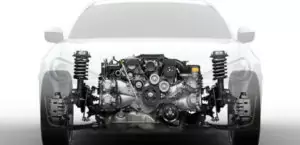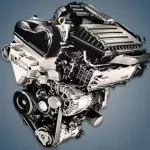The 2.0-liter CFGB or Audi TT 2.0 TDi diesel engine was produced from 2009 to 2015 and was installed on models such as Golf, Passat, Sharan, as well as Seat Alhambra and Skoda Superb. The unit belongs to the second generation EA189 and is an updated version of the CBBB diesel.
The EA189 series also includes: CAYC, CAAC, CAGA, CAHA, CBAB, CFCA, CFGB, CLCA, CLJA, CKTB, CFHC, CKUB.
Specifications
| Production years | 2009-2015 |
| Displacement, cc | 1968 |
| Fuel system | Common Rail |
| Power output, hp | 170 |
| Torque output, Nm | 350 |
| Cylinder block | cast iron R4 |
| Block head | aluminum 16v |
| Cylinder bore, mm | 81 |
| Piston stroke, mm | 95.5 |
| Compression ratio | 16.5 |
| Features | intercooler |
| Hydraulic lifters | yes |
| Timing drive | belt |
| Phase regulator | no |
| Turbocharging | Garrett GTC1549VZ |
| Recommended engine oil | 5W-30 |
| Engine oil capacity, liter | 4.3 |
| Fuel type | diesel |
| Euro standards | EURO 5 |
| Fuel consumption, L/100 km (for Audi TT 2012) — city — highway — combined |
7.0 4.3 5.3 |
| Engine lifespan, km | ~300 000 |
| Weight, kg | 165 |
The engine was installed on:
- Audi A3 2 (8P) in 2009 – 2012;
- Audi TT 2 (8J) in 2009 – 2014;
- Seat Alhambra 2 (7N) in 2010 – 2012;
- Skoda Superb 2 (3T) in 2009 – 2015;
- Volkswagen Golf 6 (5K) in 2009 – 2013;
- Volkswagen Passat B7 (36) in 2010 – 2015;
- Volkswagen Passat CC (35) in 2009 – 2015;
- Volkswagen Sharan 2 (7N) in 2010 – 2015.
Disadvantages of the Audi CFGB engine
- The Bosch fuel system with electromagnetic injectors has a long service life;
- The biggest troubles are regular leaks and an unreliable oil separator;
- Carefully monitor the condition of the timing belt, as when it breaks, the valves bend;
- The remaining problems are associated with contamination of the EGR valve or diesel particulate filter.






